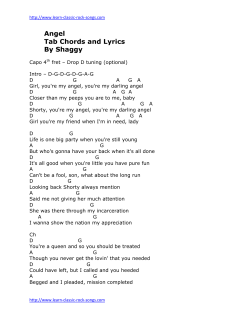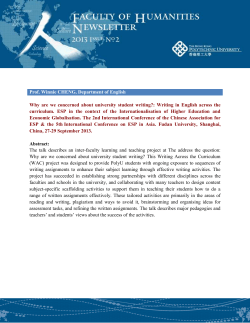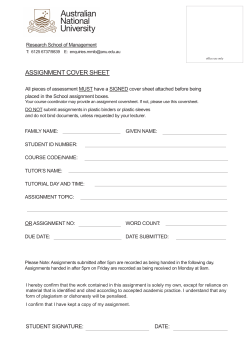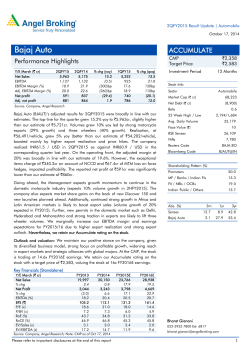
Cascadia Community College Cultural Anthropology – Sample Syllabus Online Class
Cascadia Community College Cultural Anthropology – Sample Syllabus Online Class ANTH&206 5 credits Course Developer: Tori Saneda Instructor: Office Hours: Office Phone: E‐mail: Contacting the Instructor: Email is the preferred mode of communication. The best way to do this is through ANGEL; however, sending mail directly to my school account is acceptable. You can call and leave a voicemail; however, I check my voicemail infrequently. How I respond to Students: Monday through Friday, I check my email frequently throughout the day, so you should receive a relatively quick response; I generally try to respond within 24 hours on a weekday. Should you send an email on the weekend, you will probably not receive a response until Monday. If you do not hear back from me within 24 hours, please send a follow‐up email as there may have been a technical problem. Class Emails: Copies of emails sent to the entire class will be copied in the Announcements on ANGEL. My Expectations of Students’ Response: Each student should have an alternate email address in ANGEL. Go to Preferences > Personal Information to add an email address. This will ensure that you get email both in your ANGEL inbox and your preferred email account. I expect students to check their email daily during the week and announcements at minimum every other day, although daily is preferred. If I have a problem with an assignment, I will email you, so checking your email in the week after an assignment is due is critical. Prerequisites: Include your institution’s prerequisite. Course Description: Students examine the anthropological perspective of human culture, including such institutions as kinship, politics, and religion, and evaluate the interrelationship between culture, environment and biology. Students explore the effects of globalization on culture while developing 1 critical thinking skills through the application of essential anthropological approaches, theories, and methods. This course is divided into 3 units: Culture & Cultural Anthropology: In the first unit, the anthropological concept of culture is explored, including overarching themes such as cultural relativism, holism, ethnocentrism, identity, and language. Cultural anthropology theories and methodologies are also introduced. Social Institutions: In the second unit, students examine from a relativistic standpoint, the various manifestations of social institutions such as economic systems, including subsistence strategies, political organization, marriage, family, kinship, healthcare, and religion. Globalization: In the third unit, students will research, critique and assess the impact of globalization on culture, particularly the effects on indigenous (non‐Westernized, non‐industrial, disenfranchised) peoples. Course Learning Outcomes: (based on Cascadia Community College’s course outcome guide for ANTH&206 Cultural Anthropology) By the end of the quarter, students will: Tori Saneda 7/7/10 1:53 PM Comment: Stephanie, technology skills are embedded in these outcomes; do I need something explicit? Demonstrate their communication skills by: • • • • using fundamental cultural anthropology terms and concepts in proper context developing or improving both verbal and written communication skills clearly expressing thoughts about human culture and adaptive processes successfully completing team work both in‐class and out‐of‐class • • recognizing key elements of human culture analyzing culture at various levels (individual, community, national) and from an anthropological perspective explaining anthropological theory and its application to human culture assessing the interaction between culture, biology and the environment identifying cultural traits and determining their function within their cultural context Demonstrate their critical thinking and problem solving skills by: • • • Illustrate their level of cultural literacy by: • • • • demonstrating the ability to be culturally relative interrelating personal experiences and societal forces within the context of cultural anthropology demonstrating an understanding and respect for the diversity of human culture identifying ethnocentrism Illustrate their level of information literacy by: • • • • using discipline‐specific databases and utilizing a variety of library resources assessing anthropological information in general and scholarly sources using appropriate citation standards for anthropology exploring how anthropological knowledge is gained by practicing in a few of cultural anthropology’s methodologies; e.g., real‐world observations 2 Required Texts/Materials: Spradley, James and David W. McCurdy. 2009. Conformity an Conflict: Readings in Cultural Anthropology, 13th edition. Upper Saddle River, NJ: Pearson. ISBN: 9780205664610 • • Available as an e‐text from CourseSmart for $25.85. Visit http://www.coursesmart.com/020566461X/?a=1773944 (note: downloadable version available) NOTE: At the end of the syllabus is a list of other e‐texts available at under a cost of $30 for cultural anthropology Online readings/videos Minimum Technical Skills Required: Technical: To succeed in an enhanced, online or hybrid class, you should have: • • • • • • Access to a computer (at home, school, or work) that you can use for extended periods of time. This should preferably be in a quiet environment so you can concentrate. Broadband internet access (cable, modem, DSL, or other high speed) Firefox 3.0 or later or Internet Explorer 7 or later. Safari and Chrome are not compatible with ANGEL Permissions/ability to install plug‐ins or class software (e.g. Adobe Reader or Flash) Highly recommended: up‐to‐date anti‐virus software Highly recommended: review the System Check nugget on the ANGEL home page Skills: To succeed in an enhanced, online or hybrid class, you should have the ability to: • • • • • • • Navigate web sites, including downloading and reading files from web sites Download and install software or plug‐ins such as Adobe Reader or Flash Use e‐mail, including attaching and downloading documents/files from e‐mails Save files in commonly used word processing formats (.doc, .docx, .rtf) Copy and paste text and other items on a computer Save and retrieve documents and files on your computer Locate information on the internet using search engines 3 Description of Assignments/Assessments: Assignment Course Prep Culture Collage Reading Ethnography Ethnography & Ethnology Final Essay Sustaining Indigenous Cultures Discussion Participation Total points for course Points 40 25 80 90 80 100 150 565 Course Prep: What is it? Course Prep involves several small activities to complete within the first week of this online course. These activities are designed to make sure everyone is ready to start work. Activities include, but are not limited to, posting an introduction, contributing a behavioral guideline for discussion, writing a description of your culture, submitting a team request form, and a tutorial and quizzes on plagiarism. Where do I find it? Complete assignment instructions can be found on ANGEL under Lessons > Assignments. How do I submit it? All but the plagiarism tutorial and quizzes will be turned in on ANGEL. The plagiarism quizzes will be emailed to the instructor. Culture Collage: What is it? For this assignment, students create a culture collage that graphically represents their idiosyncratic, or personal, culture. Elements of each level of culture should be included in the collage. Students will analyze each other’s collages. Where do I find it? Complete assignment instructions can be found on ANGEL under Lessons > Assignments. How do I submit it? Collages will be posted to the Culture Collage Discussion Forum. Reading Ethnography: What is it? This assignment has two parts. In the first part, each student will search the Internet for definitions of several key anthropological concepts. Definitions will be synthesized into the student’s own words. Web sites used for the assignment will be evaluated using the CARS rubric. For the second part, each student will locate an ethnography in the campus library. Some class time will be used to 4 show students how to search for ethnographies in the library catalog. Students will analyze both the ethnography and a behavior highlighted within the ethnography using a specific set of questions. Students will also determine whether or not the key anthropological concepts defined in Part I are evident in the ethnography. Where do I find it? Complete assignment instructions can be found on ANGEL under Lessons > Assignments. How do I submit it? This assignment will be turned in on ANGEL. Ethnography & Ethnology: What is it? Students will conduct ethnographic observations on an activity of their choice. Students will pair up to do a cross‐cultural evaluation. Each student will write a report describing and analyzing their findings. Where do I find it? Complete assignment instructions are on ANGEL under Lessons > Assignments. Some time will be taken in class for students to find a partner for the ethnology portion of the assignment. How do I submit it? This assignment will be turned in on ANGEL. Final Essay: What is it? Each student will write a 1500 word essay describing and analyzing one or two aspects of their idiosyncratic culture using what they have learned over the quarter. This essay takes the place of a final exam. Where do I find it? Complete assignment instructions are on ANGEL under Lessons > Assignments. How do I submit it? This assignment will be turned in on ANGEL. Sustaining Indigenous Cultures (team project): What is it? In small teams, students will choose an indigenous culture on which to research and present. The main focus of the research will be on the effects of development on the culture and what the group is doing to try to sustain their culture. Each team will create a Works Cited. Each team member will an evaluation of each team member’s contribution, including their own, along with a reflection. Where do I find it? Complete assignment instructions are on ANGEL under Lessons > Assignments. Team assignments will be handled by the instructor based on student answers to the questionnaire handed out in class. How do I submit it? Presentations will be created on a wiki. Works Cited, reflection, and team member evaluation will be turned in on ANGEL. 5 Participation: What is it? Students will be placed into discussion groups in order to participate in discussion of the readings in the Spradley and McCurdy text. Participation points are earned by taking part in weekly discussions, starting in week 2 and ending in week 10. Points are earned by meeting the minimum number of posts and through quality of posts. Where do I find it? Complete assignment instructions can be found on ANGEL under Lessons > Assignments. How do I submit it? Discussion takes place on ANGEL’s discussion forums. Non‐graded Assessments: Guided notes for online readings/videos are provided for students to use at their discretion. Grading: I will try to grade all assignments within one week of submission; however, because I grade specifically to the outcomes, it may take me longer than one week. All grade rubrics with feedback will be returned to students via ANGEL email. Course Grades Policy: Grades: Everyone starts out with a 4.0 in this class. It is up to you whether or not you keep your 4.0. You are responsible for your own learning and for improving your learning and self‐assessment skills. My feedback will focus on identifying your strengths and weaknesses of your work and helping you identify areas for improvement. I view learning as a collaborative process and encourage you to meet with me if you have concerns about your standing in the class. % of Points Grade % of Points Grade % of Points Grade 95‐100 4.0/A 82 2.7/B‐ 70 1.5/C‐ 94 3.9/A‐ 81 2.6/B‐ 69 1.4/D+ 93 3.8/A‐ 80 2.5/B‐ 68 1.3/D+ 92 3.7/A‐ 79 2.4/C+ 67 1.2/D+ 91 3.6/A‐ 78 2.3/C+ 66 1.1/D 90 3.5/A‐ 77 2.2/C+ 65 1.0/D 89 3.4/B+ 76 2.1/C 64 0.9/D 88 3.3/B+ 75 2.0/C 63 0.8/D‐ 87 3.2/B+ 74 1.9/C 62 0.8/D‐ 86 3.1/B 73 1.8/C‐ 61 0.8/D‐ 85 3.0/B 72 1.7/C‐ 60 0.7/D‐ 84 2.9/B 71 1.6/C‐ 0‐59 0.0/F 83 2.8/B 6 Course Policies: Online Class Expectations: My expectations of students in online classes include but are not limited to the following: • • • • • • • • keeping up with the readings assignments turned in on time courteous interaction with fellow students and instructor careful reading of instructions active participation on the discussion forums and team projects openness to others' opinions self‐motivation not waiting until that last minute to ask for help What you can expect from me: • • • • respectful interaction replies to emails within 24 hours during the work week; if I anticipate a problem with this, I will post an announcement I will check the "Questions for Tori" discussion board daily during the first week of the quarter and thereafter at least every three days I will endeavor to have assignments graded within one week of due date Netiquette: Guidelines for acceptable behavior on the discussion forums will be established by students during the first week of the quarter. Each student is required to post a guideline to the Discussion Guideline forum. At the end of the first week, I will compile the posts and email the final list to students. See full instructions in ANGEL. Disability support services: Cascadia Community College provides accommodations and services to qualified students with documented disabilities through Disability Support Services (DSS). Cascadia is committed to ensuring that qualified students with documented disabilities are provided equal opportunity to participate in all educational programs, campus services and activities available at the college. The goal is to fully comply with the Americans with Disabilities Act, Section 504 of the Rehabilitation Act and Washington State Law (Core Services Act). For more information or to request accommodations, please contact Disability Support Services, 425‐352‐8860 or 425‐352‐8399 (TTY). If you have or suspect that you have a disability and need an accommodation please contact the front office in Kodiak Corner at 425‐352‐8383 to make an appointment with the Disability Support Services. Services and Accommodations through DSS are not retroactive. Learning Assistance Options: The Open Learning Center provides a place for students to receive assistance with technology that support class assignments. Trained assistants are available to help students individually or in small groups. The OLC is located in CC2‐060. The Math and Writing Center provides trained staff to assist students with math courses and provide opportunities to improve writing, reading, and study skills. Students can receive tutorial assistance on a 7 walk‐in basis with assignments for classes in which they are enrolled. The Math & Writing Center is located in CC2‐080 / phone 425‐352‐8243. Course Calendar (11 week quarter) SM: Conformity & Conflict (# refers to article number, not chapter) OL: Online reading Unit 1 Week 1: What is culture? Weeks 1‐4 OL: What is culture? SM: 1 What is culture and Course Prep cultural anthropology? Week 2: What is culture? (continued) SM: 6, 7, 2, 3 Culture Collage Discussion Week 3: How does culture impact identity? OL: Identity SM: 22, 23, 24 Discussion Week 4: How does cultural anthropology work? OL: Cultural Anthropology method & ethics OL: Theory SM: 4, 5 Reading Ethnography Discussion Unit 2 Week 5: How do people get food and other stuff? Weeks 5‐9 OL: Subsistence & Economy SM: 11, 13, 14 Social Institutions Discussion Week 6: How do people organize themselves socially? OL: Marriage, Family & Kinship SM: 18, 20, 21 Discussion Week 7: How do groups get things done? OL: Political Organization SM: 28, 29 Discussion Week 8: How do people take care of themselves? OL: Health SM: 30, 38, Ethnography & Ethnology Discussion Week 9: How do people interpret the world around them? OL: Belief Systems & Worldview SM: 32, 33 8 Unit 3 Weeks 10‐11 Globalization Discussion Week 10: How does globalization impact indigenous peoples? OL: Modernization, Development & Globalization SM: 15, 17, 34 Discussion Final Essay Week 11 No Readings Sustaining Indigenous Cultures Presentations 9
© Copyright 2025


















